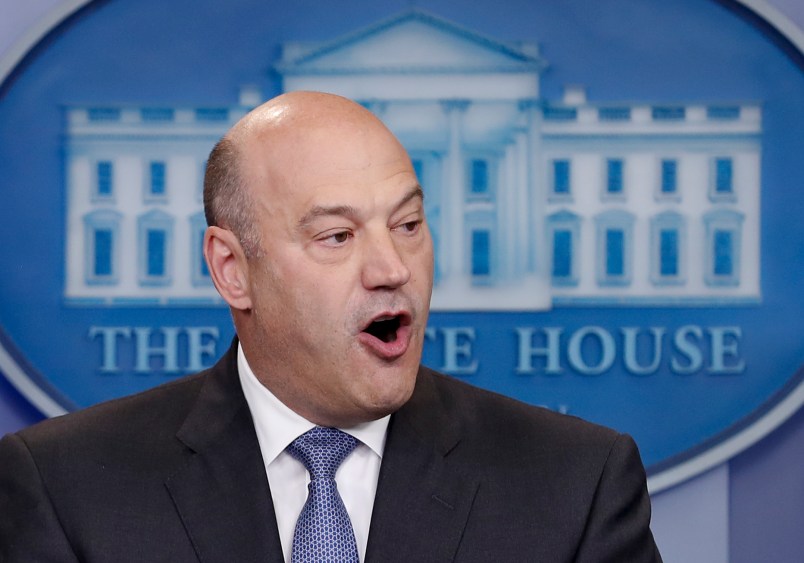The director of President Donald Trump’s National Economic Council signaled Thursday that the White House was open to keeping some of Obamacare’s taxes, which mostly affect the wealthy.
In an interview with MSNBC’s Stephanie Ruhle, former Goldman Sachs President Gary Cohn acknowledged that there are “multiple issues we’re trying to solve,” referring to Senate Republicans’ bill to repeal Obamacare and make deep cuts to Medicaid. Senate Majority Leader Mitch McConnell (R-KY) delayed a vote on the bill Tuesday.
“We can’t solve every issue in the health care bill,” Cohn continued. “We’re going to tackle taxes. Yes, we’d love to cut some of the taxes that are in the Obamacare bill. And that would be a great thing to do. If we can’t cut them in the Obamacare bill, we’re still actively involved in tax and tax legislation.”
It was unclear if Cohn was talking about the possibility that the Obamacare repeal itself could fail, or whether he meant to imply that the repeal effort could succeed if Republicans kept Obamacare’s taxes.
Ruhle had asked about moderate Republicans who “want you to cut out that you’re going to have tax breaks in there, you’re going to have tax breaks for the rich.” Some moderate Republicans have said that they are uncomfortable with the large tax break wealthy Americans would receive if Obamacare was repealed.
Sen. Susan Collins (R-ME), for example, told Bloomberg Wednesday: “I do not see a justification for doing away with the 3.8 percent tax on investment income, because that is not something that increases the cost of health care … So I distinguish between those tax increases that were part of Obamacare that increase premiums and the cost of health care versus those that do not.”
The non-partisan Congressional Budget Office estimated Monday that, through 2026, Senate Republicans’ Obamacare repeal bill would increase deficits by $541 billion, “mostly by reducing tax revenues.”
Cohn emphasized separately in the interview that, whether or not Obamacare was repealed, “We were going to get to tax reform, if this passes, or it doesn’t pass. We are on a tax reform agenda when we come back in September, when the August recess is over. We will be 100 percent engaged in tax reform.”
But he may have inadvertently tipped the White House’s hand — that the Trump administration may be willing to keep Obamacare’s taxes if it meant earning moderate Republicans’ support.
Before moving on to the White House’s plans for changing the tax code, Ruhle asked about how poorly Republicans’ Obamacare repeal plan was polling with Americans.
“Is that what America wants?” she asked.
“America will be happy with what we give them,” Cohn said.







As far as Dear Leader is concerned, the entire text of the bill could read “Section 0.1 of the US Code shall read OBAMACARE IS REPEALED, OUTLAWED, AND BANNED” and leave the entire structure in place, I’m not convinced he particularly gives a shit aside from making it sound bad and mean to Obama.
Yes, goddamn it! You will eat that fucking cat food and you will like it!
What the effing F?
This has to be complete bafflegab. The whole point of the current bill is to kill people currently on medicaid to make room for some large fraction of a trillion in tax cuts. The rest of it, horrible and disruptive though it is, is just a fiscal footnote.
Or are they going to kill the poor people just for sport and leave the taxes in there, then plan to cut rich people’s taxes even more in some other way?
Spoken like true Goldman Sachs sc*mbag who would be much happier if the majority of us dropped dead tomorrow leaving a few peons to do whatever jobs they’re given.
I read this to mean that “repeal” may go the way of “amended” and maybe with the assistance of some Dems on board. If it becomes too difficult to get the money from the ACA alone, they’ll carve out as much money as possible from other programs as well (i.e., some from the ACA, some from SS, some from Medicare, definitely the VA), pass the tax cuts for the wealthy and call it good.
Gee, it’s almost like they no clear idea of what they’re trying to accomplish.
Which, I’ll concede, is not a problem Ryan and McConnell have.